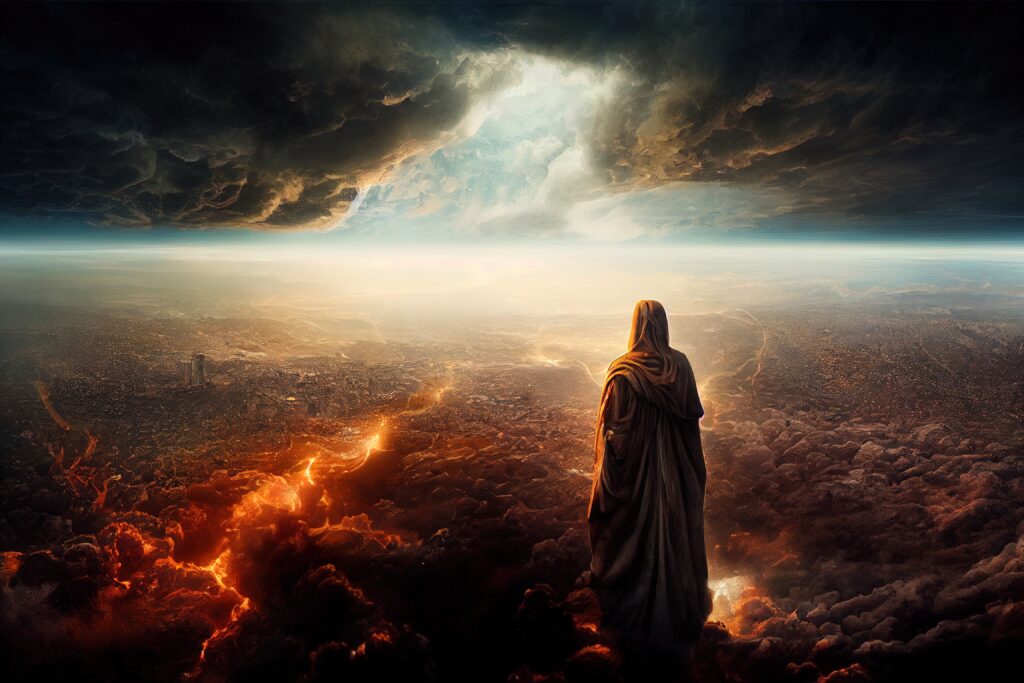
Putting the Violence in Revelation in its Context.
‘And he said to me, “The waters which you saw where the prostitute sits are peoples and multitudes, and nations and languages. And the ten horns which you saw, and the beast, these will hate the prostitute and will make her desolate and naked, and will eat her flesh and will burn her up with fire. For God has put it in their hearts to execute His purpose by having a common purpose, and by giving their kingdom to the beast, until the words of God will be fulfilled.” – Revelation 17:15-17.NASB
Being of one mind, the 10 kings unite with the beast, the false prophet, and the dragon to make war with the Lamb, However, the King of Kings and the Lord of Lords will over come them; those who follow the Lamb will receive the kingdom.
Texts like this are disturbing to many readers of Revelation. While the Babylon represented here was certainly brutal and violent herself, does that justify the use of such brutal and violent images in a biblical book?
But perhaps we are not seeing the whole picture in this text. I heard of a business establishment in America that put up a scandalous sign: “We would rather do business with 1000 Arab terrorists than with a single Jew.” You would think that people would have protested. Yet not a single person did! What was going on?
You had to see the sign in its larger context to understand.
The business establishment was Goldberg’s Funeral Home. If anyone was outraged, it was Arab terrorists, and they weren’t talking! The sign was not an expression of hostility to Jews, but rather of compassion, a wish that Jews would have a long life.
The violence in Revelation is also a matter of context. On the surface, it appears that evil is overcome using forces just as brutal and violent as Babylon was. Does that mean God is in the right because He has the might? Only if you ignore the larger context in the Book. The agent of God’s power is the Lamb (Rev.17:14,17) that was slain (Rev.5:6). The violence by which Jesus conquers Babylon is ultimately the violence done to Him.
This ‘violence’ could better be understood as justice. Love and justice do not form a contrast in the Bible but are, rather, clearly combined in the description of God’s perfect character. In the biblical account of love and justice, one cannot be properly thought of without the other. A pretence of love without justice is unfairness whereas the idea of justice without love is really cold legalism. In fact, the Bible goes even a step further in the description of God’s character. God does not merely combine love and justice; He loves justice (see e.g. Psalm 33:5, Isaiah 61:8.)
Two things we can gather from this biblical concept of God’s justice is that justice is not related to law codes, but it fundamentally concerns His heart and character. In Revelation 17 we are seeing two contrasting characters! Secondly, God loves not only the deliberation of justice but also its execution!
Although there are images of battles in Revelation, God’s people are never called to use violence on His behalf. They are called instead to suffer as the Lamb suffered. They are to overcome, not with the sword, but by the word of their testimony (Rev 12:11). In the end, Babylon’s violence leads to her own destruction (Rev 13:10; 18:5-7). But the sacrifice of the Lamb and His followers results in a world without violence (Rev 21:4).
In 17:17 God retains sovereignty over the choices that His enemies make. While evil is self-destructive in nature, God’s guiding hand is also there to limit the harm evil powers can do. In the end, not only the beast but even satan will do God’s bidding (2Thess 2:11- 12). “so that at the name of Jesus every knee will bow, of those who are in heaven and on earth and under the earth, and that every tongue will confess that Jesus Christ is Lord, to the glory of God the Father.” Philippians 2:10-11) Even the devil himself will bow!
God cannot deny Himself; God never lies; and God’s promises are unbreakable. We can be confident that the God of the Bible is the same God who (in Christ) willingly gave Himself for us on the cross. He is a God who can be trusted without reservation, and we can have confidence and hope for the future because, as Hebrews 13:8 puts it, “Jesus Christ is the same yesterday, today, and forever.”
My reader, trust in the goodness of God even when things have gone badly in your life. I have had to learn this lesson in decades past.
